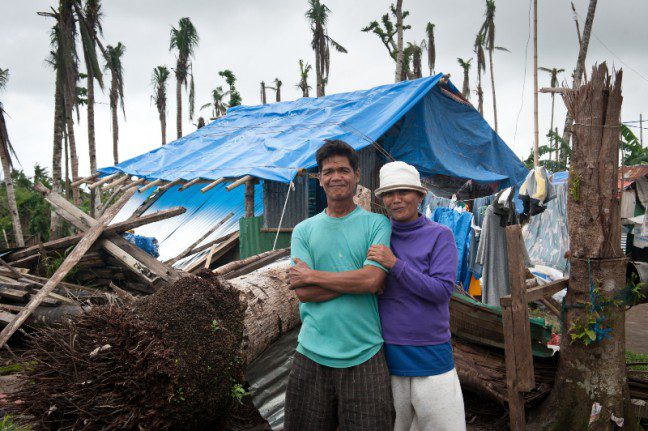February will mark three months since Super Typhoon Haiyan struck the eastern Philippines, killing over 6,300 people, displacing over four million and destroying or damaging over one million houses. Three months on, we’re now helping people get their livelihoods back.
Since November, Oxfam has reached almost 550,000 people with relief including clean water to more than 200,000 people, hygiene kits, sanitation services, cash support, water kits, rice seeds, shelter materials and cleared waste and debris.
Rose Felicio, a recipient of a hygiene kit and mosquito net, said long-term solutions were the next step in the recovery process.
“What we need most is to recover our livelihoods – our source of income. We are roofless, homeless, but not helpless.”
“What we need most is to recover our livelihoods – our source of income. We are roofless, homeless, but not helpless.” said Rose.
The powerful storm wiped out rice crops, coconut trees and fishing boats, leaving people struggling to grow food and earn an income. The livelihoods of millions of households are now at risk as they fall deeper into debt.
In Tanauan, Leyte, 90% of the coconut trees have been ruined. Many farmers in the region are entirely reliant on the trees to earn a living.
Crispin Miranda is one such farmer.
“Our primary crops have been destroyed, the source of livelihood of the people, especially those who depend on coconut production…maybe at the moment people do not feel that they need food, because assistance is still coming in. But maybe a few months from now, when no more assistance will be given it will take us time for our economy to recover…we will realise that we are really in need of food and the scarcity of food will be felt by the people.” said Crispin.
Vilma and Rainero (pictured) understand this sentiment. They too, lost everything.
“We had almost one hectare of coconut trees and a rice field. All was destroyed. We started planting rice again but the newly-planted rice has been washed away by the rain.” said Vilma.
While the Philippines government has been slow to deliver the agricultural and reconstruction support it has promised— there is progress. Crispin and Vilma are both members of the Kabuyan Farmers Association where Oxfam is providing the tools, resources and training to turn fallen trees into lumber for shelter and sale. Rice seed distribution from Oxfam has benefited nearly 6000 people in the Leyte area.
Crispin is thankful for the outpouring of support from people all over the world.
“I would like to thank Oxfam for encouraging us and giving us guidance…Oxfam has given us the equipment so let us work, let us help each other to succeed. You will see that our efforts are not being wasted, because we have benefited from all that has been given to us.”
By making a monthly donation to Oxfam Emergency 365, you’re helping our response teams save lives every day of the year.
